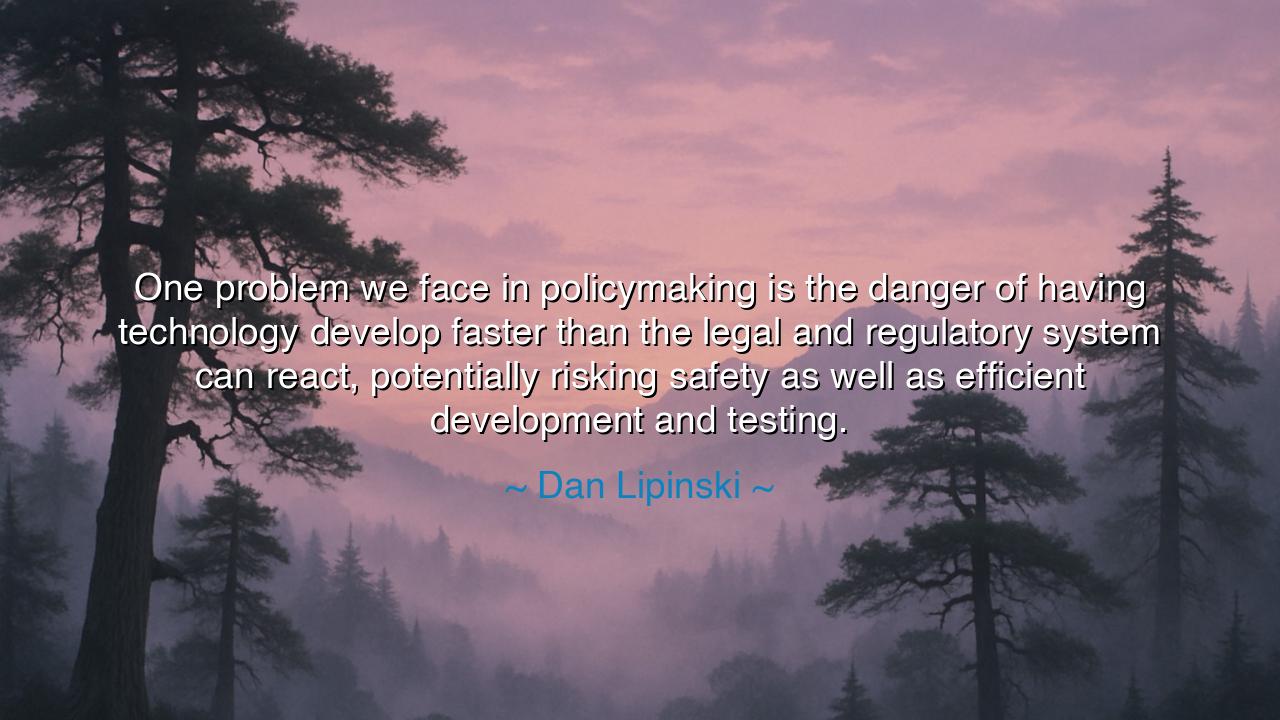
One problem we face in policymaking is the danger of having
One problem we face in policymaking is the danger of having technology develop faster than the legal and regulatory system can react, potentially risking safety as well as efficient development and testing.






Hear the warning of Dan Lipinski, who spoke as both a lawmaker and a guardian of the people’s well-being: “One problem we face in policymaking is the danger of having technology develop faster than the legal and regulatory system can react, potentially risking safety as well as efficient development and testing.” These words echo across the centuries, for they remind us of an eternal struggle between human invention and the wisdom required to guide it. The hand of man builds swiftly, but the mind of governance often lags behind, and in that gap, both peril and promise reside.
When Lipinski speaks of technology developing faster than law, he identifies one of the great dilemmas of our age. For innovation bursts forth like a river in flood—artificial intelligence, genetic engineering, autonomous machines, digital currencies—each advancing with breathtaking speed. Yet the guardians of the law, bound by debate, deliberation, and caution, move slowly. If the law fails to keep pace, society is left unshielded, exposed to dangers unforeseen: risks to safety, privacy, fairness, and even to the dignity of life itself.
The mention of “safety” calls to mind the first duty of governance: to protect the people. Consider the rise of the automobile in the early twentieth century. Cars transformed society, yet for years they sped through streets without seat belts, stop signs, or standardized safety measures. Accidents claimed countless lives before the law caught up, forging the rules and regulations that would safeguard drivers and pedestrians alike. This history embodies Lipinski’s concern—innovation without timely guidance can bring both progress and devastation.
The phrase “efficient development and testing” carries another lesson. Law that lags too far behind can also hinder progress, leaving inventors in uncertainty and industries in limbo. When policymakers fail to provide clear frameworks, innovation stumbles—not because the ideas are flawed, but because there is no path to safely and legally bring them into the world. Thus, balance must be struck: law must neither choke progress nor abandon society to its reckless advance.
History again teaches us through the tale of nuclear power. When mankind split the atom, the world was stunned by both terror and hope. In the absence of regulation, devastation appeared in the form of weapons that scarred the earth and threatened humanity’s survival. Yet with careful governance, nuclear power also became a source of energy, lighting homes without smoke or soot. This duality shows precisely what Lipinski warns of: technology itself is neither savior nor destroyer—it is the laws and ethics surrounding it that determine its role in human destiny.
The deeper meaning of his words is this: wisdom must walk hand in hand with invention. It is not enough to marvel at new tools, nor enough to fear them. Leaders must prepare themselves, studying the advances of science, listening to experts, and crafting laws that anticipate rather than merely react. For if governance always trails behind, it becomes a shadow rather than a guide, and society risks stumbling blindly into dangers it could have foreseen.
Children of tomorrow, take this teaching into your hearts: do not be dazzled by innovation alone, nor dismissive of caution. When new technologies arise, ask not only, “Can we build it?” but also, “Should we build it, and how will we guide it?” Demand from your leaders laws that are wise and timely, and in your own lives, wield new tools with care and conscience. Remember always that human progress is not measured merely by the speed of its inventions, but by the justice, safety, and wisdom with which they are used.
Thus, the wisdom of Lipinski’s words endures: that technology racing ahead of law creates both opportunity and danger, and that only by vigilance, foresight, and courage can we ensure that progress serves humanity rather than imperils it. Let this be your inheritance—that you may walk not blindly into the future, but with eyes open, hands steady, and hearts guided by the eternal balance of innovation and responsibility.






AAdministratorAdministrator
Welcome, honored guests. Please leave a comment, we will respond soon